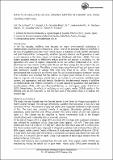Por favor, use este identificador para citar o enlazar a este item:
http://hdl.handle.net/10261/163125COMPARTIR / EXPORTAR:
 SHARE
BASE SHARE
BASE
|
|
| Visualizar otros formatos: MARC | Dublin Core | RDF | ORE | MODS | METS | DIDL | DATACITE | |

| Título: | Effects of mulching on soil organic matter in a burnt soil from Central Portugal |
Autor: | Rosa Arranz, José M. de la; Keizer, Jan Jacob; González-Pérez, José Antonio CSIC ORCID ; Jiménez Morillo, N. T. CSIC ORCID; Sánchez-Martín, Águeda M. CSIC ORCID; González-Vila, Francisco Javier CSIC ORCID ; Vieira, D.; Knicker, Heike CSIC ORCID | Fecha de publicación: | 17-sep-2017 | Editor: | European Association of Organic Geochemists | Citación: | 28th International Meeting on Organic Geochemistry 17 – 22 September 2017, Florence, Italy | Resumen: | In the last decades, wildfires have become the major environmental disturbance in Mediterranean countries (De la Rosa et al., 2012). One of the principal effects of wildfires is the loss of vegetation and litter cover, which causes a reduction in both rainfall interception and plant transpiration. Consequently, wildfires typically enhance runoff generation as well as soil exposure to the direct impact of raindrops (Shakesby and Doerr, 2006). The most widely accepted measure to effectively reduce post-fire soil erosion is mulching, i.e., the application of a cover of organic compounds on the soil surface (Robichaud et al., 2013). Mulching not only reduces surface water fluxes and their energy but also protects the soil from direct raindrop impact. The effects of mulching on post-fire runoff and soil erosion have been previously studied in various field trials (e.g. Prats et al., 2012). These trials demonstrated that mulching is an effective post-fire soil erosion mitigation treatment. Results from cultivated soils indicated that the addition of organic plant residues to crop soils also helps to improve soil structure, mainly due to an increase in soil porosity, available water content, soil aggregation, and bulk density. Beside this, the detrimental impacts of wildfires on Mediterranean and Atlantic ecosystems is in part caused by qualitative and quantitative transformations of the soils¿ most functional fraction, i.e. soil organic matter (Faria et al., 2015). Nevertheless, the effects of mulching on soil organic matter (SOM) quality in fire affected soils are still unknown, so that the main goal of the present study is to address this research gap. | URI: | http://hdl.handle.net/10261/163125 |
| Aparece en las colecciones: | (IRNAS) Comunicaciones congresos |
Ficheros en este ítem:
| Fichero | Descripción | Tamaño | Formato | |
|---|---|---|---|---|
| Effect_mulching_soil_2017_Poster.pdf | 79,79 kB | Adobe PDF |  Visualizar/Abrir |
CORE Recommender
Page view(s)
276
checked on 23-abr-2024
Download(s)
90
checked on 23-abr-2024
Google ScholarTM
Check
NOTA: Los ítems de Digital.CSIC están protegidos por copyright, con todos los derechos reservados, a menos que se indique lo contrario.
